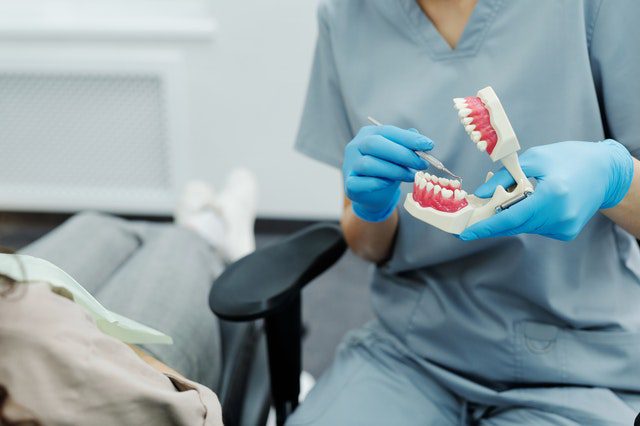
Quite simply, dental implants are the next best thing to your natural teeth. They are the ideal form of tooth replacement because they look and function exactly like a natural tooth – both the crown and the implant “root”. Dental implants are artificial teeth set on posts that are surgically implanted into your jawbone. They are not removable like dentures and bridges.
Dental implants can be used to replace a single tooth or set of teeth. In some cases, they can even be used for full mouth reconstruction. The main drawback to dental implants is their cost — they are the most expensive option for tooth replacement. But their advantages in permanence, appearance and function are well worth it, and their longevity means the cost averages out over time.
What are Dental Implants?
The term “dental implant” is misleading, because it consists of three main components, only one of which is the actual implant:
- Implant body: replaces the root of the missing tooth
- Abutment: acts as a connector between the implant and the crown
- Crown: the visible and functional part of the tooth
There are a few different types of dental implants:
- Endosteal: These are the standard type of dental implant, where the post is surgically placed in the jaw. Patients need decent jaw integrity to have this kind of implant surgery, and occasionally a bit of bone grafting is done prior to ensure the implant integrates.
- Subperiosteal: These implants are for patients without the jaw integrity to have the implant screwed into their bone. Instead, the dental implant is placed deep in the gums at the jaw line and anchored so that it stays in place.
- Zygomatic: This is the least common dental implant surgery and is reserved for cases where upper teeth need reconstructed but there is no way the jaw will hold an implant. In this case, the implants are anchored into the lower cheekbones, which is a much more invasive procedure.
Titanium vs Ceramic vs Mini Dental Implants
Titanium dental implants are the industry standard. Titanium has long been used in orthopedic (bone) installations, because the body typically won’t reject it, and bone has no issue healing around it and fusing with it. This is called biocompatibility. Even people with immune issues or other sensitivities often have success with titanium dental implants.
Ceramic dental implants, which some people consider a more holistic tooth replacement option, are also known as zirconia dental implants. Zirconia is a transitional metal, making it a ceramic. Zirconia dental implants match, if not slightly exceed, titanium implants with regard to biocompatibility and the ability to integrate with the jaw. Ceramic dental implants are a great option for people who are allergic to metals.
A few key differences between titanium and zirconia dental implants include:
- Titanium implants tend to last longer.
- Zirconia implants are typically a larger diameter.
- Titanium implants are less likely to degrade and break.
- Zirconia implants have better flexion abilities.
- Titanium implants are proven to last several decades without incident.
- Zirconia implants don’t have that dark line at the abutment.
Mini dental implants, on the other hand, are exactly like what they sound: smaller dental implants. These are the newest development in dental implant technology and allow patients with less jaw integrity the opportunity to take a dental implant successfully. At this early stage of use, longevity is unclear, and they are more likely to break than standard-sized titanium implants.
Hybrid Tooth Implant Options for Complicated Cases
A less common option for prosthetic tooth implants is implant-anchored bridges and dentures. These are often used for people who don’t have the jaw health to handle several dental implants, because a few implants are better than none!
We can complete a full mouth reconstruction with just 4 implant anchors on a complete set of dentures. Or we can anchor a sizeable bridge with just 2 implants – one at either end. While not completely stabilizing, these partial implant restoration solutions do more to preserve the health of your teeth and jaw than traditional dentures or tooth-anchored bridges.
What to Expect with Dental Implant Surgery
A majority of the time, implant surgery is a two-step process. The initial surgery is routinely removing the involved tooth or teeth, if they’re not already lost. Frequently, bone grafting is performed at this time to prepare the sites for upcoming implant placement, and to preserve bone volume.
The second step is placement, followed by a healing time of two to four months to allow the implant and the bone to integrate. Dr. Puckett will then coordinate the crown (restorative phase) with your dentist.
The standard process of dental implants is all about patience, because it lasts 6 months to a year, depending on the extent of the reconstruction and the health of the patient. However, with advances in technology and holistic oral surgery methods has emerged: same-day dental implants.
For patients in optimal health, with otherwise good oral health and bone integrity, the first two steps of the dental implant process can be performed at the same time. Because tooth removal and implant placement can be performed simultaneously, you save about three months in the implant process and minimize the number of necessary oral surgeries.
Placing Prosthetic Teeth Requires a Team Approach
Dental implants demand an integrated approach. Our oral surgeon, Dr. Puckett, coordinates the plan with your dentist and maintains communication throughout the process. Stephanie, our implant coordinator, is trained and experienced to make the implant experience seamless, and to alleviate concerns patients and restorative dentists have about dental implant surgery. Each implant patient receives a personalized treatment plan and written diagram of the steps involved. Your dentist will receive a copy of the diagram and the clinical note of the initial consultation.
As the process proceeds, your dentist receives written updates at each step. As a service to the patient and referring dentist, our office provides the impression pin in order to make the crown. This service removes the need for your dentist to order another part for your implant. Often, we handle the dental implant surgery (installation of the titanium or zirconia “root”) and then your dentist handles the installation of the actual crown (fake tooth).
Why We Recommend Zirconia Dental Implants for Some Patients
We offer our patients the option of zirconia dental implants — the only ceramic tooth prosthetic on the market. Some people simply don’t want metal in their mouths, so they choose zirconia implant roots. Others with extreme metal sensitivities may choose them to minimize risk of complications. Others prefer the aesthetic of zirconia dental implants because the ceramic color at the gum line looks more natural than titanium, which can peek out and reveal a dark line at the gums.
But ceramic tooth roots aren’t for everyone. Zirconia dental implants are more expensive than traditional titanium. And though they’ve been around for a couple decades, in oral and maxillofacial medicine, that’s really not long at all. So there isn’t a lot of information on how zirconia dental implants hold up long-term, though the current information is extremely promising.
The Logistics of Comprehensive Tooth Reconstruction
Dental implants are the most costly option for tooth replacement, but for good reason. They’re the only permanent, comprehensive way to replace the function of a tooth inside and out. However, there are several measures our office takes to make dental implant surgery more cost-effective for our patients:
- We work closely with your dental insurance to advocate for coverage of the procedure(s).
- Our billing rate is limited to the value of the service(s) performed so the surgery stays affordable.
- Our method for charging anesthesia is based only on minutes used instead of rounding up into 15 or 30-minute increments, which is typically industry standard.
- We offer our patients 0-interest payment plan options to spread the expense out.
With these approaches, we’re able to save our patients $300-$800 per implant!
Proper Aftercare for Your New Dental Implants
We can get you all the way to a totally-restored, beautiful and healthy smile with our holistic dental implant surgery techniques, but how well you recover from there is largely up to you. Don’t worry; we’re available for questions, concerns, issues and any emergencies, but there are steps you can take to make sure your recovery from the implant procedures goes smoothly:
- In the first 24 hours, use ice on and off to reduce swelling
- Avoid hard foods the first week and be careful in that area with hard foods until fully healed
- Avoid hot and cold foods for the first week
- Avoid spicy and acidic food and drink for the first week
- Sleep with a bite guard until the implant is healed
- Make sure to finish the full course of antibiotics your oral surgeon prescribed
- Don’t smoke
If you’ve chosen to use our 10-day homeopathic prep and recovery kit for your dental implant surgery, make sure you stay consistent with the directed regimen. Starting 3 days before your procedure and continuing for 7 days after, this kit reduces discomfort, optimizes healing, prevents infection, and speeds recovery.
If you think dental implants might be the best option for your full mouth restoration, schedule a consultation with our oral surgeon. And don’t forget to ask our office about how we make dental implant surgery affordable by saving our patients $300-$800 per tooth.







